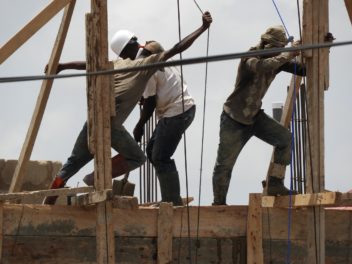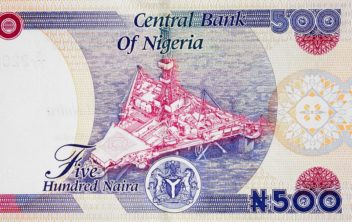Openness no guarantee against abuse and corruption
Increased openness by the authorities is often a requirement for developing countries to receive foreign aid. But at its worst, openness can be harmful.
Many developing nations generate significant revenues from natural resources that have the potential to benefit most of the population and boost living standards. But history shows that this hasn’t always been how it works.
On the contrary, natural resources have often led to war, corruption and huge inequalities, where a powerful elite or large corporations make off with most of the profits.
But doesn’t increased transparency in government planning and decision-making ensure a fairer distribution of revenues?

Africa is rich in natural resources. The distribution of wealth, however, is not always that simple. Illustration: Shutterstock, Scanpix / NTB
Ideal and reality collide
“Transparency and accountability of state authorities are fundamental concepts in the fight against corruption,” says Levon Epremian, who is working on his doctorate in NTNU’s Department of Geography.
Epremian has been investigating state authorities’ increased openness regarding governance and management of natural resources, with a particular emphasis on Liberia.
“The idea of transparency works more or less like this: governments make more information available to the people. The people become more aware of matters that concern them. People are then able to scrutinize this information before they hold the authorities responsible for their actions,” he says.

Ghana is part of EITI, but corruption is still a problem in rural areas. Photo shows workers in Accra. Photo: Shutterstock, Scanpix / NTB
However, it doesn’t really work this way in practice. Increased openness does not guarantee that most people will become engaged or that they’ll become more aware about matters that concern them. In the worst cases, Epremian believes openness can even be harmful. On this last point he has support.
“Politicians and decision makers believe that this is how openness works. But researchers have been sceptical,” says Epremian’s supervisor Professor Päivi Lujala at NTNU’s Department of Geography.
These sceptical researchers may be right.
Assistance requires transparency
The global standard of transparency and good governance for the extractive sector, which includes oil, gas or minerals – is called EITI, or Extractive Industries Transparency Initiative. Approximately 50 countries are currently implementing EITI standards.

Coltan from DR Congo, which contains tantalum used in microchips. Its extraction has led to many violations of human rights. Photo: Shutterstock, Scanpix / NTB
Several major supporters, such as the World Bank, the UN and the EU, require governments in developing countries to be transparent about revenues generated from natural resources. They consider openness necessary for a functioning democracy. Countries that do not agree to the EITI standard of transparency may miss out on financial support and investment.
“In Ghana we see a disappointingly small effect from the reporting and publishing of these revenues,” says Professor Lujala.
Lujala has investigated openness in several countries, and has focused on Ghana in particular. But even if the effect of transparency is small in Ghana, at least there is some kind of effect. Some countries are showing no beneficial effect.
So why isn’t this approach working? The researchers point to several reasons, which are not necessarily due to bad will on the part of implementing governments.
- You may also like: A new look at corruption and greed
Not readily accessible
One reason may be that this information is not readily accessible for most people.
For example, says Lujala, “In Ghana, the information was made available online and in the major newspapers. But most of the country uses radio and television to stay informed.”
Ghana is actually a country where the central authorities really do make an effort to provide information to its citizens. So the information is available, and the government has technically done its job, but in practice only a small minority of the population actually has access to the information.
Lujala believes that this information should be made available in other ways for it to be useful.
Radio or TV are good examples of effective communication channels. Direct text messages and local information meetings are other ways to reach people.
In other cases, authorities may make the information available as annual reports. However, information that comes in this format is not broken down to enable local stakeholders to understand the relevance of the information at a local level. Yet this approach still means that governments have officially complied with the EITI standard.
Epremian finds similar conditions in Liberia, where he has investigated how EITI information is disseminated in five of the country’s fifteen regions.
Liberia quickly chose to implement the EITI standard after the ceasefire came into force in 2003, which gave the country the opportunity to change the way it used revenues from the country’s considerable natural resources. But simply implementing EITI does not mean that the information reaches its intended audience the way it’s supposed to.
Wrong starting point?
Perhaps these policies have the wrong starting point. Is greater transparency enough on its own to make most people act on issues that concern them?
“Even if you have access to information, it doesn’t necessarily mean that you’ll act on that information,” Epremian points out.
That’s not how it works in Norway either. Even though you can check and review all your business documents and familiarize yourself with projects and budgets, few of us do it. But that does not mean that this transparency is wasted.
“For transparency to work, we depend on stakeholders who are already engaged and who use this information,” say Lujala and Epremian.
This could be the media, but could also include civil society and activist organizations and others who have enough resources and dedication to make use of the information.
Granted, even when information does manage to reach most people, they simply may not care enough to do something about it. People often vote independently of the facts, for example – for the candidate who belongs to their ethnic group or social set or who has the clearest message, regardless of its content.
Article continues below photo.
Pulled out
Countries that no longer need foreign support are sometimes less keen to implement the EITI standard than before.
Azerbaijan pulled out of the EITI last year after fourteen years of membership. Their withdrawal came after the country had already been suspended because of concerns about civil rights abuses.
Shahmar Movsumov, head of the country’s oil fund, denied that they pulled out because they no longer want to implement EITI principles. The country’s authorities have since come out with their own information about conditions in Azerbaijan. However, they are no longer part of EITI.
May counteract its purpose
“In the worst cases, openness seems to be making conditions worse for people locally,” say Lujala and Epremian.
In a world of limited resources, more detailed information at the national level may not be what people need most. A village affected by the development of a major extractive project won’t necessarily get the information in time to file an objection.
Authorities in a country that can show they are following the EITI standard gain increased status both internationally and nationally, even if no improvements are under way on the ground. Lujala believes that openness can legitimize adverse actions this way, by allowing countries to merely comply with international rules of transparency from a technical standpoint.
These kinds of superficial approaches to compliance “can also deflect attention away from bigger questions. You can have transparency about what a business is doing in a country. But you’re not asking whether that business should actually be allowed to operate in the country in the first place,” Epremian says.
EITI doesn’t get involved in these questions, because it is not their role.
Still support openness
All this does not mean that Lujala and Epremian oppose government openness. In some cases, the information that is made available through transparency initiatives could support groups that advocate for the better use of revenues generated by a country’s resources. Transparency also can be important in fighting corruption, among other things.
But the main message from the two researchers is that increased transparency is not enough on its own.
Increased openness can be one of several mechanisms, but it is not the magic bullet that some decision makers and politicians apparently think it is.








